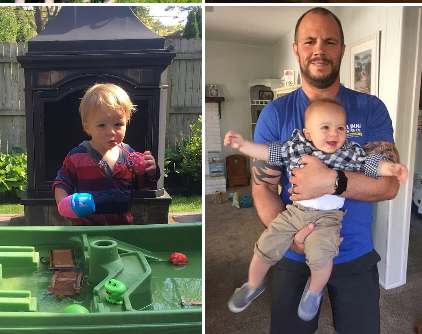Nick Catone is reminded of the son who was never given the opportunity to mature when he puts his daughter to bed. The memory of May 12, 2017, the day his 20-month-old son Nicholas passed away suddenly while sleeping, frames every evening. Although Sudden Unexplained Death in Childhood was listed as the official cause of death, Catone and his wife Marjorie have long maintained that recent vaccinations were the real cause. Not only did their grief stay personal, but it also sparked a national dialogue about trust, medicine, and the boundaries of closure.
Catone, a former middleweight in the UFC who is referred to as “The Jersey Devil” in the cage, is accustomed to suffering. However, nothing he had experienced during his fighting career had prepared him for the heartbreak of losing a child. According to him, the grief comes in waves, sometimes in the form of tolerable ripples and frequently in the form of overwhelming tsunamis. He occasionally makes the drive to Windward Beach Park, where he has erected a swing in Nicholas’ honor. He sits there by himself, broken by the silence, allowing it to briefly destroy him before he reintegrates into the rhythm of life, always changed but never completely recovered.
| Attribute | Details |
|---|---|
| Full Name | Nicholas Catone |
| Known As | Nick Catone |
| Date of Birth | September 1, 1981 |
| Profession | Retired UFC Fighter, Gym Owner, MMA Coach |
| MMA Nickname | The Jersey Devil |
| Son’s Name | Nicholas Catone Jr. |
| Son’s Age at Death | 20 months |
| Date of Son’s Death | May 12, 2017 |
| Cause of Death (Official) | Sudden Unexplained Death in Childhood (SUDC) |
| Parents’ Belief | Parents attribute death to recent vaccinations |
| Partner | Marjorie Madison-Catone |
| Surviving Child | Daughter, Madeline |
| Gym | Nick Catone MMA Academy, Brick Township, NJ |
| Link for Reference | Learn The Risk Campaign Coverage |
Every aspect of their home life was shattered by the loss. Catone has a clear memory of the incident. Their son was found dead in bed by his wife. She let out a scream. In the adjacent room, their three-year-old daughter saw the horror firsthand. For them all, childhood innocence was shattered in a single, terrifying moment. “He was gone and blue,” remembers Catone. After several months, she asked, “Daddy, why did Nicholas go to heaven? Was he blue, that’s why?
What came next was reinvention rather than retreat. Catone dedicated his life to creating a gym that would serve as more than just a venue for martial arts; it would also serve as a shrine, a legacy, and a means of honoring his son. The airplane in the gym’s logo pays homage to Nicholas’s passion for them. A tiny model plane bearing the words “Fly High Nicholas” is suspended above the entrance. Each lesson, repetition, and drop of perspiration on those mats can be traced back to that young boy’s memory.
However, Catone’s battle extended beyond mats and bricks. Together with the contentious organization Learn The Risk, he rose to prominence as one of the nation’s most outspoken opponents of vaccinations. The group portrayed the Catones as victims of a flawed healthcare system in lectures, videos, and billboard ads that capitalized on his family’s tragedy. Catone publicly contested the verdict, believing that his son’s death was more than a mystery, even though the medical examiners stuck to their conclusion that there was no discernible connection to vaccines.
His message swiftly gained popularity after being shared on social media. He posted the letters he wrote to his son every night on Facebook. Thousands participated. Some expressed pity. He was accused by others of disseminating harmful false information. Facebook completely erased his account during the COVID-19 pandemic, when public health officials tightened restrictions on false narratives. That action only made him feel more persecuted. Later, Catone stated that he would sue Facebook for more than $5 billion, claiming that the company had erased Nicholas’s priceless memories and images in addition to engaging in what he perceived as censorship.
He gained notoriety as a result of the controversy, but not without expense. Catone’s position became divisive. Critics called him reckless, while supporters praised his bravery. It was impossible to overlook the emotional core of his advocacy, regardless of one’s stance. This father buried his son and was unable to sleep until he understood the absurd. Any parent, regardless of political affiliation, may be able to relate to that quest for purpose.
Similar fields have seen the emergence of celebrity voices. Jenny McCarthy was both praised and criticized for her assertion that vaccines were the cause of her son’s autism. For decades, Robert F. Kennedy Jr., a current presidential candidate, has expressed similar opinions. Although the majority of the medical community continues to reject these claims, their continued existence betrays a more serious problem: a decline in public confidence in once-infallible institutions.
The core of that fracture is Nick Catone’s story. Grief gave him a stage, even though he didn’t look for one. The intensity of his love and the depth of his grief demand recognition regardless of whether his conclusions are supported by the evidence. He is among the many who struggle not only with loss but also with a culture that frequently expects bereaved people to keep quiet if their sorrow turns into controversy.
Inside his gym, pictures of Nicholas are displayed between fight posters and punching bags. They serve as a reminder of more than just loss—love. Students at the gym, many of whom are teenagers, grow up learning about Nicholas and how that grief was used to build every square inch of the facility. It teaches not only physical toughness but also emotional resilience.
The Catones continue to be a poignant representation of the nation’s ongoing struggle over vaccines, public health, and individual freedom. What began as the heartbreak of a family has turned into a public case study of the intersection of misinformation, advocacy, and grief. The stakes are very human: truth, trust, parents, and children.




